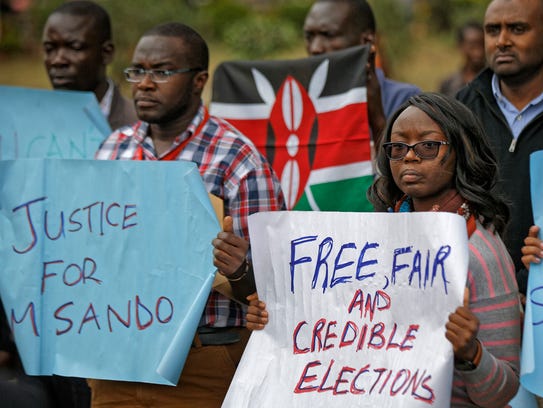
Fall of 2017 up until today has been a very interesting political period for Kenya as a country and its people. In August of 2017 a general election was held where the “current” president, Uhuru Kenyatta, won presidency for a second term. However his victory was not received well by the Kenyan people.
This particular election period was to be the most democratic election Kenya was to see because previous elections had been rid with corruption, tampering, and violence. Unfortunately, this election took after the other elections that Kenya has put on. On August 8th, Uhuru Kenyatta, the current Kenyan president, went up against a recurring rival Raila Odinga. Odinga was considered a man of the people, a man who advocated for and did all things in the interest of the people. Those who stood behind him did so because they were tired of the corruption of the elections as well as having Kenyatta as president again.
The initial election occurred in early August, but Kenyatta’s win was annulled by the Supreme Court because of the sketchy nature of the election which resulted in a recount of votes. On October 26th, the recount occurred and Kenyatta won 98% of the votes yet only 39% of voters turn out. Is that not a sign of corruption? Democratic erosion?
Kenyatta was sworn into office for his second term last November but Odinga, the people’s president, boycotted the election by having an inauguration of his own. Both parties fought to sway voter support through attacking the latter campaign. Odinga’s self-inauguration was short and sweet. He prodded the emotional crowd with notions of a more transparent election and democracy. He stated that his action of inauguration was his way of answering a, “higher calling to assume the office of the people’s president of the Republic of Kenya. Odinga’s swearing in was meant to show the people that what he was doing was legal and that it could not be described as a coup.
Why does the Kenyan democracy now become shaky?
Kenyatta’s victory rose many concerns about the credibility of the election and of political meddling. Odinga’s public skeptical nature of the integrity of the election further fueled the emotions of the people. This led the people to hold protests and demand reform as that of Odinga’s to address the corruption and Kenyatta’s re-election.
The shakiness also occurs because there are two presidents. One elected “judicially”, and another self-sworn in but accepted by the people. This raises the question, is the Kenyan government truly for the people?
In the Kenyan constitution, the people are allowed to assemble and elect the president, per article 37 and in article one the constitution states that all Kenyans are able to exercise their power directly. President Kenyatta was not favored by the people yet he won 98% of the votes per the 39% of voters who voted. However, thousands upon thousands came out in support of Odinga to witness and commemorate his inauguration. Though Odinga had the support of the people, he did not have the support of the government for his swearing in ceremony was prevented from being broadcasted.
Kenya has freedom of the press but to a certain extent. The media is heavily monitored especially during election periods. For example with Odinga’s ceremony, authorities forced tv station off air so hat there would be no media coverage. This form of prevention was undemocratic because it lacked a degree of respect for the country’s constitution and its notion of free speech and press. By way of intimidating the journalists to prevent publication further created a shaky democracy.
In an attempt to strengthen political relationships and re-democratize the country, despite their ongoing disputes, Kenyatta and Odinga facilitated a discussion in hopes of creating peace and aid in the reunification of the country.
The 2017 election served to showcase the lack of a transparent, free and fair election along with the way in which the media is or is not able to broadcast news. These restrictions and illegalities contribute to the erasure and decline of democracy in Kenya. The increase and continuation of corruption perpetuates the rise of democratic erosion as well as the decline in faith the people have in the government.
If vote tampering, media restriction, and corruption continue, violence can and will continue in the country when it comes to election periods. The Kenyan people may get to a point where enough is enough and violently revolt against the government in hopes to overthrow by exercising their right to power as stated in act one of the constitution.
Like Nigeria and Ghana, Kenya is a country that other African countries look up to. With saying that, the Kenyan government should reevaluate the way corruption fuels the government along with the lack of a voice the people seem to have. Instead of contributing and continuing democratic erosion in the country, the Kenyan government should implement laws which reverse the adverse effects of the previous laws. Kenya, along with many other African countries, have the potential to have better democratic countries, it is just a matter of removing and combating corruption.
Article: http://www.bbc.com/news/world-africa-42870292?intlink_from_url=http://www.bbc.com/news/topics/cm6pmm4v266t/kenya-general-election-2017&link_location=live-reporting-story
*Photo by Ben Curtis, USA Today*

0 Comments